 |
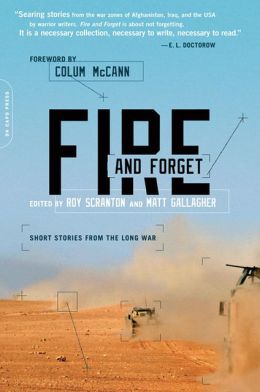
Fire and Forget: Short Stories From the Long
War, edited by Roy Scranton and Matt Gallagher
Philadelphia: Da Capo Press, 2013. (256 pages,
$15.99)
FIRE AND FORGET is an absolutely terrific collection of
stories by fifteen exciting new writers, all products of the recent and current wars in Iraq and Afghanistan.
Fully
a third of the writers have already published their own books. Siobhan Fallon's book of connected stories, YOU KNOW WHEN THE
MEN ARE GONE, has already garnered much deserved critical acclaim. Her story, "Tips for a Smooth Transition" adds a valuable
chapter to her earlier oeuvre of the unavoidable miscommunication, disconnect, and struggles with loneliness and infidelity
that occur between absent or returning soldiers and their spouses, left behind either alone or with small children.
It's
hard to pick a favorite entry here, but I loved Phil Klay's "Redeployment," maybe because of its dialogue of authentic GI
language filled with all its political incorrectness which nevertheless brought guilty guffaws from me as I read it. I'd offer
an example, but it's too filthy for most of my review venues. And yet the same story, with the narrator's fear of public places
and the dilemma of dealing with a dying and beloved dog made me wince in empathy. Jacob Siegel's "Smile, There Are IEDs Everywhere"
shows three veterans of widely divergent backgrounds reuniting in New York City for a drunken binge. The difficulties of that
"smooth transition" are glaringly displayed in the course of that evening.
In "Play the Game" Colby Buzzell (author
of the memoir, MY WAR: KILLING TIME IN IRAQ) offers a chilling portrait of a futureless veteran who is probably suffering
from PTSD, living in a transient LA hotel, drifting aimlessly between dead end jobs. Roman Skaskiw's "Television" presents
a well-meaning but naive young lieutenant who has yet to learn that war is about more than just the killing portrayed in video
games.
Gavin Ford Kovite's story, "When Engaging Targets, Remember," gives us a thinking, college-educated soldier
who fears he may think too long about the Rules of Engagement he has been given, thus endangering his own life and those of
his fellow combatants. Then there is "The Train," Mariette Kalinowski's story of a female vet who obsessively rides the subways
after having watched her best friend killed in front of her by a suicide bomber. Who says there are no women in combat?
"New
Me" by Andrew Slater, and Brian Van Reet's "Big Two-Hearted Hunting Creek" both deal with veterans who have been mutilated,
traumatized and damaged who are trying to find their places in an apathetic civilian society. "Roll Call," by David Abrams
(author of the novel, FOBBIT), is the shortest and yet perhaps one of the most affecting of all the stories in the collection
because of its subject: a unit memorial service for a fallen comrade. Like Phil Klay, Abrams has mastered the obscene, often
hilarious, jargon of the enlisted man. Perry O'Brien's "Poughkeepsie" gives us the poignant plight of a lonely soldier who
has gone AWOL to find a pen-pal who, he learns too late, wants nothing to do with him.
Ted Janis's "Raid" shows most
effectively how too many combat tours can burn a man out, while Brian Turner (author of the poetry collection, HERE, BULLET)
offers a dream-like look at a patrol lost in seemingly endless desert dunes in "The Wave that Takes Them Under."
The
final two pieces in the book are by its two main editors. Matt Gallagher (author of the memoir, KABOOM), in "And Bugs Don't
Bleed" paints an effective mini-portrait of a burned-out, deeply damaged vet, faithless women and greedy, predatory civilians
who claim to support the troops. But as one character says, those troops "have been completely abandoned by the rest of the
country." Roy Scranton's "Red Steel India" (an excerpt from his as yet unpublished novel, WAR PORN) shows the boredom and
monotony of perimeter guard duty and the distrust and petty cruelties the soldiers show toward their Iraqi counterparts. (The
tone of Scranton's story brought to mind Joydeep Roy-Bhattacharya's fine novel of the Afghanistan war, THE WATCH.)
I
know I can't even begin to do justice to the excellence and variety of the veterans' experiences brought together between
the covers of FIRE AND FORGET. So I'll just say this. There is not a clinker in the bunch. Every story deserves its place
in this landmark collection. I will remember these names and will be watching for them.
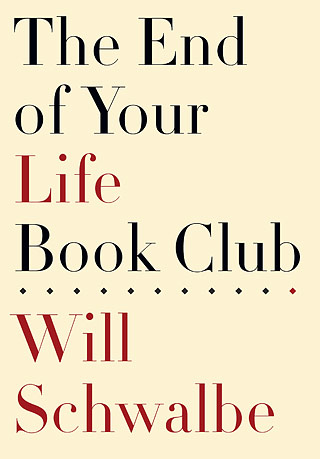
THE END OF YOUR LIFE BOOK CLUB by Will Schwalbe
New York: Borzoi Books, 2012. (329 pages, $25)
Watching a parent's gradual decline and death to pancreatic cancer is certainly
a somber subject, but somehow Will Schwalbe's story of his mother's last two years in THE END OF YOUR LIFE BOOK CLUB becomes
more of a celebration and a tribute than you would have thought possible. You end up almost envying the author for the special
close relationship he shared with his mother, a well-known and much-loved champion of causes.
Schwalbe is a very talented
writer, and his approach to telling the story of his mother's final weeks, months and years is unique. He describes how they
formed a book club of two and discussed their literary choices whenever they could, but mostly while his mother was being
infused with toxic chemo treatments or waiting to see her doctors. Always close, the two became even closer as they used their
mutual love of good books to learn more about the world, themselves and each other.
While I might have wished for more
details about the author's own life and the rest of his family, I had to admire how he kept to his own clearly defined focus
- the importance books and reading had always held in his family. This made their story unique, even as the discussions of
books and writing allowed you ever deeper into their system of beliefs and ideals. The author's sexual orientation - he is
openly gay - is not avoided but it is not emphasized either. Even that aspect of their story is elucidated through books,
as Will tells of discovering the books of Christopher Isherwood during his college years.
At first I found the 'books'
aspect of the story more interesting than that of Will and his mother. (Indeed, the literary allusions are scattered everywhere
and many of the books are discussed at some length, and there is a bibliography at the end of the book.) But I quickly found
myself wanting to learn more about the life of Mary Ann Schwalbe, a truly remarkable and one-of-a-kind woman. The end, which
you of course knew was coming from the start, is nevertheless very difficult. There is a point in the final weeks of his mother's
life, where Will is ready to tell her how much he loves her, but instead he tells her how proud he is of her. At first he
berates himself for this sudden change, but then he reconsiders, figuring she already knew he loved her, but how often does
a child tell a parent how proud he or she is of that parent? A good point, I think.
As a confirmed and lifelong reader,
I was already prepared to love this book. But as a son, I was not prepared for its emotional impact. This is good writing
about a painful and difficult subject and completely deserving of its success. Highly recommended.
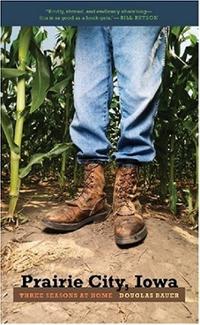
Prairie City, Iowa: Three Seasons at Home
(Bur Oak Book) by Douglas Bauer
Iowa City: University of Iowa Press, 2008. (344
pages, $19.95)
In PRAIRIE CITY, IOWA Douglas Bauer has written an evocative pitch-perfect
'biography' of a time and a particular place. It is not a memoir, as I had expected. But it was not a disappointment either.
Because Bauer is a skilled observer and reporter. Indeed, at one point he admits that the book is more reportage than memories.
But this guy is one helluva good reporter, clear-eyed and objective. And this is no easy task, when you consider that Bauer
grew up in Prairie City and is writing about friends, family members and neighbors - subjects fraught with uneasiness and
not for the faint-hearted. About himself, Bauer remains a bit circumspect, telling us only that he was something of an outsider
in this small Iowa farming community. He went away, but not very far away, to college, then a couple of journalism jobs he
didn't seem to much care for, a marriage that didn't work out. So he came home with the express purpose of writing about where
he came from.
While he writes, he becomes involved, working at the local grain elevator, tending bar, helping his father
farm. He follows local politics and a mayoral and town council race. He mentally files away information and later writes it
down. Actual interviews are not really emphasized, which is probably a good thing, since writing is not considered a serious
profession by the citizens of Prairie City. People wonder aloud, "When are you going to work for a living?" They don't mean
to be rude. They're just curious. "Work is measured here in bushels, head, acres, miles per day behind a wheel. I didn't expect
anyone to understand the muscular worth of writing."
What impressed me most about PRAIRIE CITY, IOWA, was that Bauer
was only about thirty years old when he wrote it. (It was first published in 1979 and has only recently been reprinted.) And
yet he knows how to zero in on the important truths. Here's a sample -
"In Prairie City, nothing is more manifest than
the designated steps toward death. Squares on a game board.: first home, small and rented. Children. New home, long, new,
bedrooms for the future. In town, in the country. Smaller home. Nursing home. Funeral home ...
"... one can see just
as clearly the exact fashion of his future. A man visits his mother at Clearview Manor and knows that he'll be visited there.
He'll lean forward, mean with pain, in the same beige lobby and strain to hear his son's cheery litanies. Most of us will
end this way, in a clean beige room, dutifully visited, but mercifully, we don't know its precise address ..."
As someone
who currently visits my own mother in such a place, Bauer's description of the steps toward death and that 'clean beige room,'
rang chillingly true. The young author saw things clearly and he wrote it down truthfully. Now Bauer is about my age, on the
downslope of his sixties. I wonder if he has revisited his own thirty year-old clearsighted vision recently. I think he has.
In the Coda, added for the new addition, he writes poignantly of his own father's decline and death and his mother's failing
strength and reduced circumstances. I suspect it was hard for him to write these things. It's hard to read about them, but
it is still good reportage, mixed this time with more memories and experience.
Doug Bauer was/is a good son. He was/is
also a good writer and this is still a damn good book.
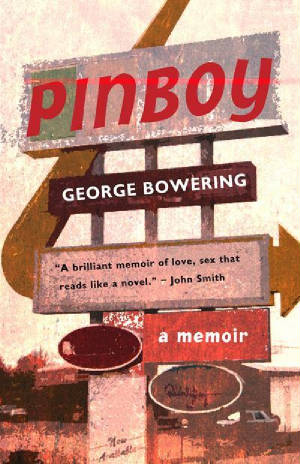
PINBOY: A MEMOIR by George Bowering
Toronto: Cormorant Books, 2012. (276 pages, $29.95)
George Bowering's newest book, a memoir called PINBOY,
is an absolute hoot. I loved it!
Bowering, who has written literally scores of books - poetry, plays, essays, fiction,
etc. - was once Canada's Parliamentary Poet Laureate and has received numerous honors for his work over a career that spans
more than fifty years. And yet, prior to reading this book, I had never heard of him. PINBOY was recommended to me by another
Canadian writer whose work I greatly admire, Elizabeth Hay. She apparently enjoyed the book nearly as much as I did, which
I could be surprised at, since, besides being a hilariously funny book, PINBOY is also perhaps one of the "dirtiest" books
I have read in years. And I put that in quotes because I'm not sure "dirty" really adequately describes Bowering's brutally
candid, deliciously ribald, yet also sometimes very sensitive look at what it was like to be fifteen years old, in love with
the idea of being in love, and horny as hell in the early 1950s in a small town in southern British Columbia. Whew! That was
a real run-on mouthful, huh?
But yeah, it really is pretty dirty, come to think of it. Why else would I have enjoyed
it so much? Lotsa sex in there. And not just the "solitary pleasures" most fifteen year-old boys are most familiar with (and
young George was no different), but a few other variations too, mostly involving his actual girl friend, Wendy Love(above
the waist privileges), and an unscrupulous sexually rapacious teacher, Miss Monica Verge, the high school Home Economics and
Business teacher who was at least twice the age of our hero. This latter 'relationship' was a source of great wonderment,
fear and trembling to Bowering, although certainly not unwelcome.
Bowering himself calls PINBOY his attempt "to tell
about a moment in my adolescence ... when I was trying to live an ordinary kid's life while trying to keep four female human
beings happy." The other two females were his mother (who understood her son all too well), and a rather mysterious and obviously
poor girl from the other side of the tracks named Jeanette MacArthur. His attempts to break through the tough shell of isolation
and independence of this latter female make up some of the best, most sensitive, parts of his story.
But PINBOY is
not all about sexual awakening. There's plenty of that 'ordinary kid' stuff in there too, although Bowering was never, I suspect,
really 'ordinary.' He loved books, something that set him apart from many of his peers. Like me, George always packed a book
wherever he went. And he tells us about what he's reading too. That year it was mostly westerns (Max Brand, Luke Short, Wayne
D. Overholser, Ernest Haycox, etc.), although he began sampling other kinds of stuff that year too - Poul Anderson, Ray Bradbury,
James M. Cain, Erskine Caldwell and George Orwell. George also worked. He had a part-time job setting pins in the local bowling
alley (hence the title) and also toiled in the local fruit orchards, pruning, thinning, picking, etc. He kept up with all
the latest popular music. He had a few close friends in Will Trump, Joe Makse and John Jalovec, and liked to hang out with
them around town (particularly the pool hall), speculating and telling lies about girls and women, smoking and drinking, horsing
around and hiking in the nearby countryside. Bowering talks about the importance of looking and dressing well - the greased
back 'boogie cut' hair fashion of the times, and the 'drape' pegged trousers and often homemade shirts. The agonies of having
almost-but-not-quite-right fashions. In other words, all the usual angst that goes with being a teenager.
Bowering
was also an avid baseball and sports fan and worked as a sports reporter for the local newspaper, wearing a funky old fedora
with a homemade 'Press' card tucked rakishly in the hatband. His love affair with baseball was one that would last his whole
life.
There are so many things I want to say about this truly excellent coming-of-age memoir that I just can't seem
to get it all straight in my head, so I'm gonna just give you a few samples here.
On religious differences -
"...
the kids in a small town will eventually hear about the strictest rules laid down by someone else's preachers. The Jehovah's
Witness kids were not supposed to read any books except the Bible. The Lutheran kids were not supposed to listen to the hit
parade. The Holy Roller girls could not use lipstick. The Catholic kids could commit sins all they wanted to, because all
they had to do was confess them to the priest and start all over again, clean as a whistle."
On comic books -
"After
some US popular psychologist claimed that comic books were turning kids into criminals, parents all over the place tried to
keep them out of our hands. Nowadays, when teenagers carry cocaine in one pocket and a cell phone you can download fellatio
movies from in the other, comic books don't seem so scary."
On books and reading -
"My extra-curricular reading
went along with my loneness, as it still does. It contributed to it, I think. Sometimes it pissed people off ... I think they
might have been smart enough to think that my reading was somehow a criticism of their lives devoid of reading. But I just
liked it. It gave me two lives running at the same time. Why would anyone turn that down?"
On boys and early driving
experiences -
"Boys driving tractors are really adolescents acquiring a high regard for their own sexual likelihood.
I faintly sensed that when I sat up on the seat of that little grey Ford tractor, with the compression snout out front of
my crotch. It is part of nature's plan that teenaged lads should roar around fruit groves on loud motorized phalluses, covered
with sweat and striped with grime."
And on and on. The thing is, Bowering is a guy who is completely comfortable in
his own skin as a writer. Enough so that he's not afraid to poke fun at himself. Here's what he said about his own poetry,
much of which has been published in small unknown magazines or by obscure presses -
"I know that guys almost my age
have eaten Velveeta sandwiches so they can get my chapbooks of acerbic verses into the hands of the forty people who want
to read them while sitting and waiting for the prune juice to work."
I mean this Bowering guy is just plain flat-out
FUNNY. He writes like Ring Lardner unleashed from the strictures of censorship. I laughed out loud, I chuckled, I chortled.
And I often cringed in recognition. This is writing - GOOD writing - about the universal experience of growing up, of turning
from a boy into a man. More than once here Bowering refers to his current self as an old "gink." Me, I'm an old "geezer."
I suspect they mean pretty much the same thing, because I can relate. PINBOY is simply one hell of a good read. And not just
for ginks and geezers, but for anyone who loves good writing. Bravo, Bowering. Write on!
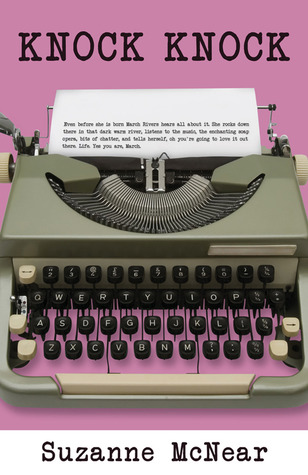
KNOCK KNOCK by Suzanne McNear
Sag Harbor, NY: The Permanent Press. (200 pages,
$28)
I liked this book very much. KNOCK KNOCK is a very unusual
sort of book. It is a "fictional memoir," with an engaging heroine in March Rivers. You remember that song, "It's a Hard Knock
Life," from ANNIE? Well, in many ways, March's life was that, and then again maybe not so much. What do I mean? Well, she
came from a wealthy family in little LaRue, Wisconsin. But her parents were not the most loving kinda people, which may have
caused some insecurities early on. Boarding school, Vassar, a youthful affair. Then she married Warren Wright, this California
guy who was kind of a jerk - a drinker, a dreamer and a wanna-be-writer who didn't do much to support March and their three
girls. But she always had the family fortune to fall back on, so even after Warren left, Daddy's money was there for her when
she needed it. So after surviving a mental and emotional meltdown for a while, she finally managed to pull up her socks and
go back to grad school, after which she got a good editorial position at PLAYBOY magazine and was able to support herself
and her three daughters.
And that's when the story really got interesting, at least for a booklover like me. She tells
of her early aspirations as a writer and brings in real names of writers and literary types who befriended her along the way.
People like Maggie Cousins, Playboy fiction editor Robie Macauley, Nelson Algren, Studs Terkel and Saul Bellow. Cousins, a
NYC editor saw promise in the first pages of March's novel and its "beaten bird" narrator, and encouraged her to finish it.
But it would be nearly fifty years before the novel was finally finished, after March's daughters were grown and married and
had kids of their own.
And that's where the story really became interesting to this booklover, with all of its real-life
literary figures and anecdotes - about Dickey, Malamud, Bellow, Updike, Cheever and others.
KNOCK KNOCK is a book for
booklovers. It reads like a who's who of literature from the 60s and 70s. The odd thing is it also reads like the work of
a much younger woman. Its author may be deep into her seventies by now, but she still retains all the appetites, emotions
and sensibilities of her younger years. It's not until the final pages, the Epilogue, that you feel the wisdom gained from
those younger hard-knock years. Did I say I LIKED this book? Well, I do. Suzanne McNear can write like nobody's business.
Highly recommended.
|
 |
